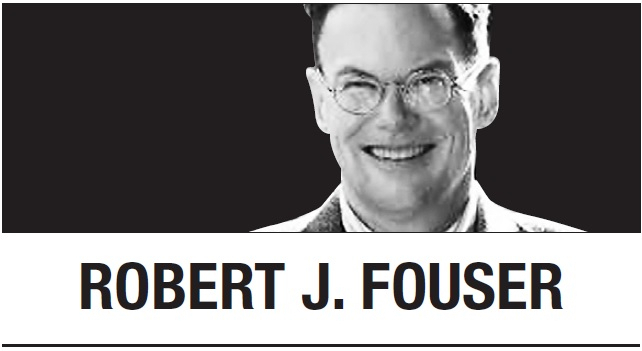[Robert J. Fouser] After the National Assembly election
By Korea HeraldPublished : April 19, 2024 - 05:30

By any measure, the results of the April 10 National Assembly elections were a disaster for President Yoon Suk Yeol and his People Power Party. No incumbent president since democratization in 1987 has suffered a more resounding rebuke. The question now is what it means for the future of South Korean politics and, more broadly, the country itself.
After the votes were counted, the main opposition Democratic Party of Korea and affiliate party Democratic United ended up with 175 seats, up 19 from before the election. The ruling People Power Party and its affiliate People Future Party, meanwhile, won an embarrassingly low 108 seats. The Rebuilding Korea Party, a left-of-center third party led by professor-turned-politician Cho Kuk won 12 seats, a significant accomplishment given its late entry into the race.
The contrast with the previous 2020 election is stark. In that election, former President Moon Jae-in’s Democratic Party gained 163 seats, giving it a sizable majority for the rest of the president’s term. This boosted Moon and, to date, he remains the only South Korean president who left office with an approval rating above 40 percent, and the only one who had an average approval rating above 50 percent for the five years. In that context, the People Power Party‘s failure to gain a significant number of seats to push it close to a majority, has the opposite effect on President Yoon. His approval ratings have languished around 40 percent, often dipping lower, since taking office in May 2022. The disastrous results risk turning him into a lame duck at an earlier point in his term than any other previous president.
What, if anything, can Yoon do to save his presidency? Yoon’s essential problem is his inability to compromise and build consensus. His razor-thin victory in 2022 and the opposition Democratic Party‘s majority in the National Assembly suggested that his best course of action was to reach out to the main opposition party to address pressing issues. Instead, he chose to ignore the opposition and go it alone on policy. The South Korean president has broad power in foreign policy that Yoon took advantage of. With the National Assembly in opposition hands, domestic policy requires compromise, and Yoon has little to show for his time in office except for a record number of vetoes.
For starters, Yoon needs to meet with opposition leaders and discuss issues where they can find common ground. Yoon should have a high-profile meeting with the leader of the Democratic Party, Lee Jae-myung, his opponent in the 2022 election. He should also meet with Cho Kuk, leader of the newly formed Rebuilding Korea Party. He needs to show the people that he respects the powerful opposition as a partner in governing. The president needs to be presidential.
But even if Yoon turns things around, his presidency will end in May 2027. This means that politicians will increasingly focus on the next presidential election in 2027 and the National Assembly election in 2028. The Democratic Party‘s strong showing puts Lee Jae-myung in a strong position to run for president in 2027. The problem, of course, is that up-and-coming Cho Kuk could challenge Lee for leadership of the center-left political bloc. Both men are involved in legal tangles under the current administration, but for now, the quiet competition risks becoming divisive as 2027 approaches. Sharp intra-bloc divisions have been one of the leading causes of defeat in presidential elections.
The People Power Party will need a candidate as well. Big names in the party, such as Oh Se-hoon, mayor of Seoul, and Na Kyung-won, are often cited as potential candidates. Results of the National Assembly elections show that the People Power Party has largely shrunk itself into a regional party centering on the southeast Yeongnam region and elderly voters elsewhere. To win the presidency and a majority in the National Assembly, the People Power Party must find a way to broaden its regional and generational appeal.
For South Korea, the situation means political gridlock at a time when the nation needs a broad consensus to address difficult problems, such as the demographic crisis. The increasingly tense global geopolitical situation also risks a crisis that would require a swift response and national unity. Gridlock and political polarization could hinder such a response.
Repeatedly, South Korean voters have chosen moderation over extremes. The middle is strong and not nearly as polarized as the current situation suggests. As 2027 approaches, this enduring trait will reward politicians who seek consensus while punishing those who seek division. Politicians who understand this will be the winners.
Robert J. Fouser
Robert J. Fouser, a former associate professor of Korean language education at Seoul National University, writes on Korea from Providence, Rhode Island. He can be reached at robertjfouser@gmail.com. The views expressed here are the writer‘s own. -- Ed.
-
Articles by Korea Herald



















![[Today’s K-pop] Treasure to publish magazine for debut anniversary](http://res.heraldm.com/phpwas/restmb_idxmake.php?idx=642&simg=/content/image/2024/07/26/20240726050551_0.jpg&u=)